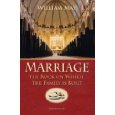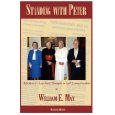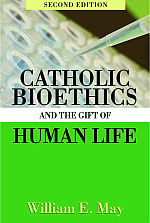|
The 2nd edition of Marriage: The Rock on Which the Family Is Built (Ignatius Press, 2009; the first ed. was published in 1995) begins with an Introduction to the Second Edition, which summarizes and updates relevant socio-economic studies that had been included in the introductory part of Chapter One of the 1st ed. It includes completely new chapters, one (Chapter six) on Pope John Paul II's Theology of the Body, the other (Chapter Seven) the teaching of Pope Benedict XVI on marriage and family. Chapter One, on marrriage as person-affirming, love-enabling, life-giving, and saving reality, has been revised in order to develop arguments given in the 1st edition and to integrate material from the "theology of the body." Chapter Two, on marriage and the complementarity of man and woman, has been revised to show its compatibility with major ideas of the "theology of the body," and Chapter Three, on Humanae Vitae has been deepened and developed by integrating the thought of John Paul II. Chapter Four, on Church teaching and the laboratory reproduction of human beings, has not been revised, but Chapter Five on the family as domestic church is organized more theologically and shows how this idea is rooted in the teaching of Vatican Council II. The new edition is thus substantially larger than the first, brings up to date the socio-economic and theological studies relevant to marriage and family, and offers readers an overview of John Paul II's famous "theology of the body" and our present Holy Father's teaching on marriage and family. November 2009
Standing with Peter: Reflections of a Lay Moral Theologian on God’s Loving Providence. Bethune, S.C.: Requiem Press, 2006, 92 pp. In these reflections May takes us from his early family life, his early years in the seminary, the illness that precluded his ordination, his first career as an editor of Catholic books, his marriage and family life with his wife Patricia and their 7 children, the cataclysmic events of 1968, especially those surrounding Humanae Vitae, his second career as professor of moral theology at The Catholic University of America and the Pontifical John Paul II Institute for Studies on Marriage and Family, his work with the International Theological Commission with then Cardinal Ratzinger. Russell Shaw, a noted Catholic journalist, writes:
This work offers a clear, complete, and convincing examination and explanation of Catholic moral theology. Here one finds not only what the Church teaches but also why she is obligated to do so and why this teaching is true. This updated and substantively revised edition of a work first published in 1991 and in 1993 expanded to include a thorough discussion of the teaching of the Catechism of the Church and John Paul II’s Veritatis Splendor includes an excellent section on the biblical foundations of moral theology, virtue, natural law and moral absolutes, a devastating critique of proportionalism, and a magnificent portrait of the Christian moral life as a vocation to sanctity and whose whose magna carta is the Sermon on the Mount and its Beatitudes. Among the reviews this work has received is the following:
Catholic Bioethics and the Gift of Human Life. 2nd edition. Huntington, IN: Our Sunday Visitor Press, 2008, 382 pp. This thoroughly revised edition of a book first published in 2000 contains eight chapters: 1. Church Teaching on the Major Issues in Bioethics; 2. Making True Moral Judgments and Good Moral Choices; 3. Generating Human Life and New Reproductive Technologies; 4. Contraception and Respect for Human Life; 5. Abortion and Human Life; 6. Experimentation on Human Subjects; 7. Euthanasia, Assisted Suicide, and Care of the Dying; and 8. Defining Death and Organ Donation. Among some of the specific issues taken up, including some still open to legitimate debate by theologians loyal to the magisterium, are the “adoption” of frozen and abandoned embryos, the proper way to cope with ectopic pregnancies, gamete intrafallopian tube transfer (GIFT), and the validity of the neurological criteria based on the functioning of the entire brain to determine whether a person has died. Edward Furton, editor of National Catholic Bioethics Quarterly declared:
Catholic Sexual Ethics: A Summary, Explanation, and Defense. 3rd edition. Huntington, IN: Our Sunday Visitor, 2011, 352 pp. The first edition of this work appeared in 1984; an expanded version of the 1st edition was published in 1996. A second edition was published in 1998. This third edition was prepared by May and includes 9 chapters and a “Pastoral Conclusion.” The chapters are: 1. The Church’s Teaching on Sex; 2. The Biblical Teaching on Sex; 3. Sex in the Catholic Tradition; 4. Patterns of Thinking in Moral Theology; 5. Conscience: Its Meaning, Formation, and Relationship to Church Authority; 6. Chastity, Christian Marriage, and Virginity; 7. Chastity and the “Obligations” (Love-Based Demands of Married Persons); 8. Chastity and the “Obligations” (Love-based Demands of Unmarried Persons). Pastoral Conclusion. In his “Foreword” to this 3rd edition, His Eminence Donald Cardinal Wuerl declares:
Scott Sullivan, reviewing the 2nd edition, wrote as follows:
Version: 29th September 2011 |




